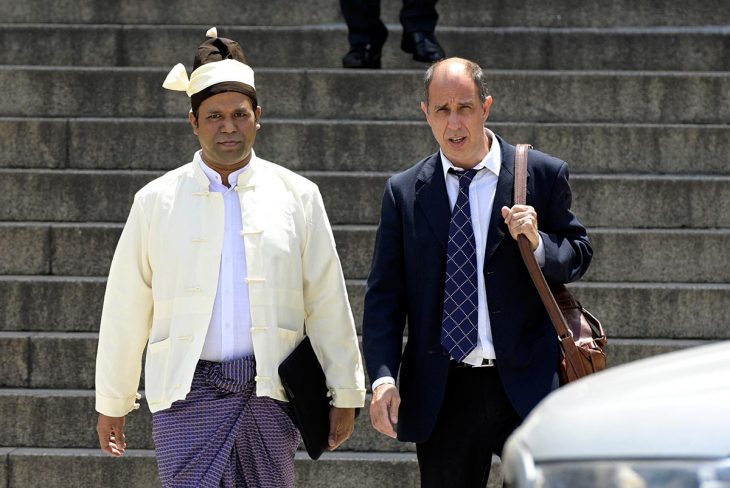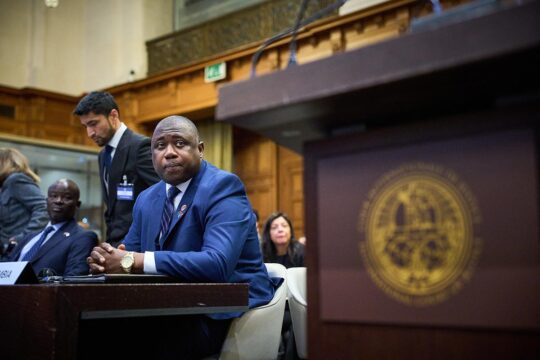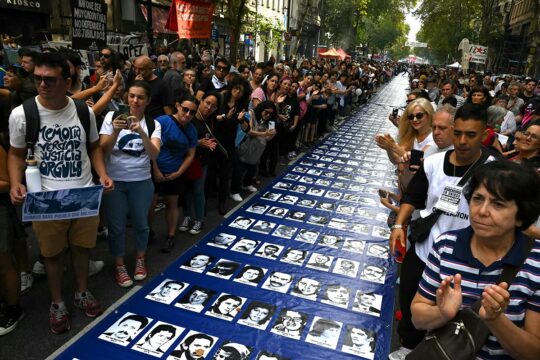“This is a big achievement, a great moment for us. We are seeing that for genocide you can seek justice anywhere, and we are grateful for that,” says Tun Khin, president of Burmese Rohingya Organisation UK (BROUK), an NGO. His enthusiastic reaction follows the Argentine judiciary’s decision, announced on November 26, to open an investigation into genocide committed against the Rohingya in Myanmar (Burma). The procedure has been triggered under the universal jurisdiction of Argentine courts, following a complaint filed by BROUK in November 2019. For Tun Khin, the preliminary hearing before the Court of Appeal of Buenos Aires last August was a milestone. “For the first time, we are giving testimony at a court. There is a chance we can get justice,” he says. “I have faced restriction and discrimination. I could not move around in Burma without a permit. I have seen my elder brothers waiting to get a permit to get married, my fatherland being confiscated by the military. That gives me a little bit of [relief] that the judge listened.”
Six women also testified remotely from Cox’s Bazaar, Bangladesh, where they live in a refugee camp. Aged in their twenties, they described the violence committed by the Burmese army in 2017 in their villages in Arakan province, western Myanmar. They spoke of the rapes they were subjected to, their relatives killed before their eyes, their villages burned.
From institutional discrimination to ‘genocidal intent’
The Rohingya minority has been the target of institutional discrimination for decades in Myanmar, particularly under the 1982 Citizenship Law. As Muslims in a majority Buddhist country, the Rohingya are considered illegal migrants from neighbouring Bangladesh. The country's 2012 democratic transition has been accompanied by increased violence against them. In 2017, following attacks on police stations by Rohingya insurgents, the Burmese military conducted brutal reprisals against Rohingya villages, causing more than 700,000 people to flee to Bangladesh. The United Nations called the operations "ethnic cleansing" and accused the army of "genocidal intent".
For Tomás Ojea Quintana, the lawyer of BROUK and the six women, the case could progress quickly with the first hearings, notably of Tun Khin, by the end of the year in Buenos Aires. This is an achievement for this jurist who knows the situation in Arakan very well. As a former UN special rapporteur for human rights in Myanmar between 2008 and 2014, he constantly sounded the alarm, particularly on the situation of the Rohingya.
“Fighting a common enemy”
The Argentine judiciary’s decision comes ten months after the February 1 military coup in Myanmar. The army, which had ruled the country with an iron fist between 1962 and 2011, ended a decade of democratic transition (2011-2021) by overthrowing the elected government of Aung San Suu Kyi. Since then, she has been detained in a secret location and was sentenced on December 6 by a military court to four years in jail for "inciting an uprising". The sentence was reduced by half the same day, by decision of General Min Aung Hlaing, head of the military junta. Prosecuted in several other cases, Aung San Suu Kyi could face more than 100 years in prison.
For the past ten months, fighting has been increasing throughout the country. More than 7,800 people have been arrested and 839 killed by the junta, according to the Association for Assistance to Political Prisoners, a Burmese NGO based in Thailand. A whole generation, those who grew up during the decade of democratization, are fighting the return of the army. This Spring Revolution is also bringing about a change in the perception of ethnic minorities, especially the Rohingya, according to Aung Myo Min, Minister of Human Rights of the "Government of National Unity" (GNU), formed by opponents of the military coup. "Many people thought the Rohingya made up the story but after the coup, many people in the cities and [other] areas never experienced the human rights violations like right now,” says Tun Khin. “It was the first time they saw soldiers shooting into the crowd, the first time they saw dead bodies and houses being burnt down. So it is a shock. And they realize it is done by the military and they recall prior accusations, and so those accusations were true and reliable. Now we are fighting a common enemy.”
Who will defend the Burmese State before the ICJ?
The contrast with the scenes in December 2019 is stark. Images of Aung San Suu Kyi and Min Aung Hlaing were then painted side by side on large posters in the streets of Rangoon, the economic capital, as a sign of support against the accusations of genocide made by the UN. The majority of Burma's population, despising the Rohingya, stood united behind the army and the head of government, outraged by these accusations from abroad.
On December 10, 2019, Aung San Suu Kyi listened impassively to the judges of the International Court of Justice (ICJ). This court based in The Hague had been seized by Gambia, acting on behalf of the Organization of Islamic Cooperation (OIC) under the 1948 Convention on the Prevention of Genocide. The 1991 Nobel Peace Prize laureate took the floor to defend her country's policy, denying any genocidal intent in the violence committed by the military against the Rohingya community. Now she is a prisoner of those she defended at the time.
Who will come to take her place on behalf of Myanmar at the ICJ hearing scheduled for January? Both the military junta and the GNU claim to be the legitimate representatives of Myanmar. At its December 1 meeting, the UN accreditation committee did not make a decision, so the issue remains pending until the next UN General Assembly in September 2022. Gambia's lawyer, Arsalan Suleman, is not commenting on this highly symbolic and political issue. But he assures us that the coup has had no impact on the ICJ proceedings. On January 23, 2020, the ICJ asked the Burmese authorities to put in place measures to prevent further violence against the Rohingya. According to Suleman, Myanmar has submitted the reports required by the court on time. Since the coup, Arakan has been one of the quietest regions in the country, notes International Crisis Group analyst Richard Horsey, who adds that "the Burmese army is too busy elsewhere”.
Support of the UN Mechanism
“We will fully cooperate with all efforts that make the perpetrators accountable,” says the GNU's minister of human rights. The objective of his tiny team, he says, is to collect and collate as much evidence as possible of abuses committed by army units in the country. “We have received thousands of cases and we secure them in order to prepare for possible legal proceedings. We used the human rights defenders network that we knew before. We try to have the victims interviewed by [them] but it is complex and dangerous.”
This painstaking task is also being done by the Independent Investigative Mechanism for Myanmar (IIMM), established by the UN Human Rights Council in 2018 to ensure the collection and preservation of evidence of crimes committed in Myanmar. It is an asset on which Tomas Quintana Ojea also intends to rely before the Argentine judiciary: “It has most of the evidence that prove the crimes committed in Rakhine [formerly Arakan]. We are pushing for the court and the prosecutor to engage with them. IIMM has of course been established to support these kind of cases.”







